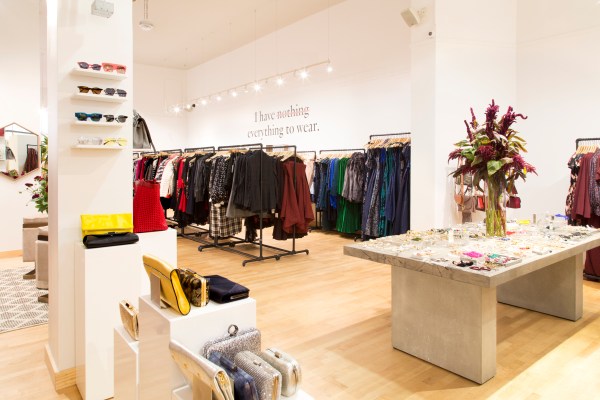When Rent the Runway co-founders Jennifer Fleiss and Jennifer Hyman got their first term sheet, it had an exploding clause in it: If they didn’t sign the offer in 24 hours, they would lose the deal.
The co-founders, then students at Harvard Business School, were ready to commit, but their lawyer advised them to pause and attend the meetings they had previously set up with other investors.
Twelve years later, Rent the Runway has raised $380 million in venture capital equity funding from top investors like Alibaba’s Jack Ma, Temasek, Fidelity, Highland Capital Partners and T. Rowe Capital. Fleiss gave up an operational role in the company to a board seat in 2017, as the company reportedly was eyeing an IPO.
But the shoe didn’t always fit: Earlier this year, Rent the Runway struggled with supply chain issues that left customers disgruntled. Then, the pandemic threatened the market of luxury wear more broadly: Who needs a ball gown while Zooming from home? In early March, the business went through a restructuring, furloughing and laying off nearly half of its workforce, including every retail employee at its physical locations.
In 2009, Fleiss and Hyman were successful Harvard Business School students. Hyman’s college roommate knew a prominent lawyer who agreed to advise them on a contingency basis in exchange for connecting them with potential investors.
Still, fundraising “was extremely hard,” Hyman said. “We were in the middle of a recession and we were two young women at business school who had never really done anything before.”
Fleiss said venture capital firms often sent junior associates, receptionists and assistants to take the meeting instead of dispatching a full-time partner. “It was clear they weren’t taking us very seriously,” Fleiss said, recounting that on one occasion, a male investor called his wife and daughter on speaker to vet their thoughts.
In an attempt to test their thesis that women would pay to rent (and return) luxury clothing, Fleiss and Hyman started doing trunk pop-up shows with 100 dresses. On one occasion, they rented out a Harvard undergraduate dorm room common hall and invited sororities, student activity organizations and a handful of investors.
Only one person showed up, said Fleiss: A guy “who was 30 years older than anyone else in the room.”
Old-fashioned meets nontraditional
Scott Friend of Bain Capital Ventures was 18 months into his investor role when he got the invite to attend their pop-up shop. The team had met him two weeks into fundraising.
“It was a rare chance to see the team and the potential product market fit in action,” he said. “I always think there’s no replacement for seeing entrepreneurs in their environment and seeing the product in real-time and to really feel the emotional experience and impact.”
His first impression was that Rent the Runway stood out from the flurry of new online business ideas being pitched to him, a result of the dot-com bust and momentum coming online.
“Jenn and Jenny didn’t say they wanted to raise a pile of money to be ready,” he said. “They put together 100 dresses and were running shows at Harvard and Yale sororities to validate what the women really wanted. They were doing it the old-fashioned way to prove it.”
Unfortunately, retail in 2009 was a “nontraditional investment for Bain Capital Ventures,” said Friend. The firm had not done many consumer investments and was almost solely investing in B2B companies.
As the new kid on the block, Friend needed to convince the entire partnership that Rent the Runway was worthy of an investment. Moreover, he told Fleiss and Hyman that he would “prime, prep and sell Rent the Runway to partners before they even got to the room.” Fleiss said she felt like they were on the same team before a term sheet was even wired.
Ultimately and obviously, Friend said he convinced the Bain team by showing the “market size of the dress-wearing universe.” After about 10 weeks of back and forth, a term sheet was offered — with a 24-hour clause and double the capital that Fleiss and Hyman wanted.
“[It] was likely a result of being super-early in my career and not knowing any better,” Friend said, who claims he did not remember the clause. “I haven’t seen something like that in a long time and wouldn’t recommend it,” he said. “A forced deadline doesn’t help make a good long-term match in my opinion. Fortunately in this case I didn’t totally screw it up.”
When the lawyer told Fleiss and Hyman to pause before signing, the co-founders thought back to their experience with Friend. Both founders said it didn’t take much thought to realize he was the perfect candidate to be the “third co-founder” of Rent the Runway. They signed within the next day, Fleiss recalls. Friend was their nomination for The TechCrunch List, a new data initiative analyzing which investors truly cut first checks into founders.
“We were lucky in getting to know Scott and honestly being right in placing a bet on him,” Fleiss said. Hyman said that from the first conversation, talks felt much less like a pitch and much more like a working session. When talking to potential investors, “ask them what their long-term ambitions are,” she recommended.
The co-founders liked that Friend was a newer member of the Bain Capital team because it meant that he was signing up for the long term and wouldn’t retire anytime soon. “When you go into a relationship with a seed or Series A investor, that is the most important relationship in your entire company,” Hyman said. “Interview that person as if you were interviewing your co-founder,” she said.
Hyman advises other founders to look for the time that investors spend trying to understand the mechanics of their business.
“I would just recommend that founders spend significant time with seed-stage investors — go to a meal together, take a walk, talk about your business, understand what makes that investor tick as a person and evaluate whether you connect with them,” she tells TechCrunch.
Twelve years later, Friend isn’t just the first check; he’s a senior advisor. Both co-founders said they call him multiple times each week.

Jennifer Hyman and Scott Friend. Image Credits: Jennifer Hyman
After Friend’s first investment, Hyman said he has built personal relationships with the company’s entire executive team, even helping Rent the Runway alumni find new jobs.
“I remember heated board conversations where I wanted to expand our business out of a la carte rental business into a subscription business,” Hyman said. “The board was very anxious about it because they weren’t believers that rental could exist for more casual occasions and that there was a larger market size for Rent the Runway.”
Even though she wasn’t sure if Friend was even behind her larger vision — that people would wear rented clothes every day — he supported her vision. Today, Rent the Runway’s subscription business accounts for 75% of revenue.
Fleiss said she and Friend now co-invest on startups together. The other day, she passed on a job candidate to him.
Friend says he feels lucky to be the first call even as what he describes as “deep-pocket investors” have joined the Rent the Runway cap table.
“Founders have to think about this strange idea that they are literally hanging out with this person for the next decade,” said Friend, who was previously a founder. “I think that entrepreneurs don’t often realize that they’re the scarce commodity, not [investors].”

